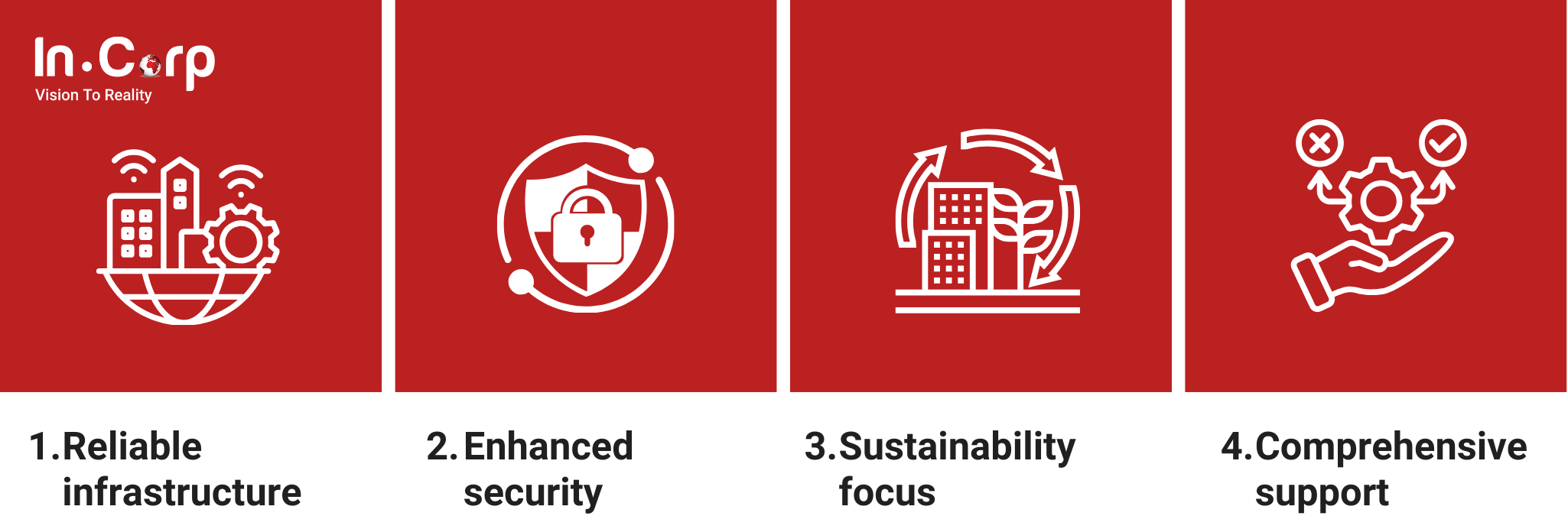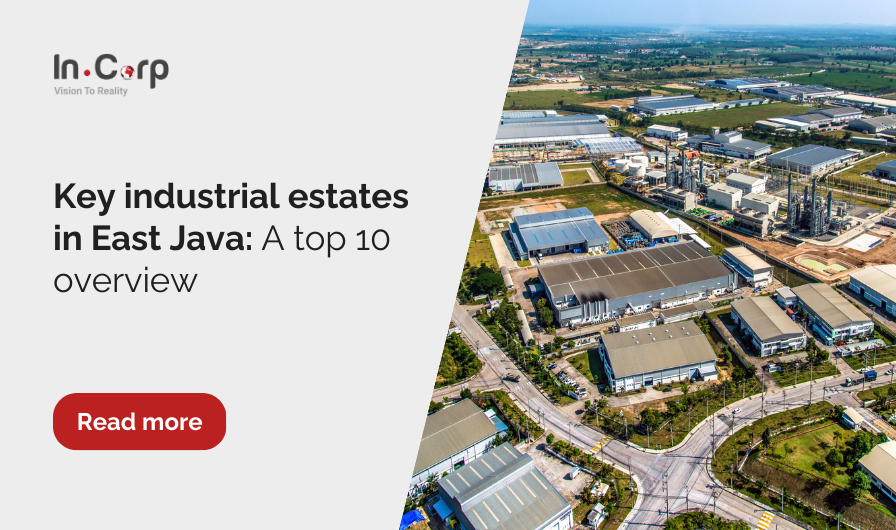East Java’s industrial sector is undergoing rapid expansion, driven by the growth of industrial estates. These strategically located facilities offer manufacturers a compelling value proposition through advanced infrastructure, shared resources, and a conducive business climate.
This article will explore the essential factors driving this trend and assess its future potential for East Java’s economic growth trajectory.
The expansion of industrial estates in East Java
East Java Province is experiencing rapid industrial growth. With a vast land area of 31,784 hectares, the region strategically expands its industrial zones to accommodate the surging demand for manufacturing investment.
Only a fraction of this potential, approximately 4,097 hectares, is dedicated to industrial parks. Prominent examples include the expansive 1,761-hectare Java Integrated Industrial Port Estate (JIIPE) and the 140-hectare Gresik Industrial Estate (KIG).
Recognizing the immense potential, the government and private developers actively pursue new industrial projects. Key initiatives include:
- The development of a 4,300-hectare agroindustrial area in North Gresik
- The transformation of 285 hectares of Salt Laka into an industrial zone
- The establishment of an 800-hectare industrial park in Ploso, Jombang
- The ambitious plan for a 10,000-hectare industrial area in Mojokerto
What is the definition of industrial estate?
According to Indonesian Government Regulation No. 24 of 2009 (Chapter 1, Article 1, part 2), an industrial estate is a designated area planned for industrial activities.
Licensed industrial parks companies develop and manage these zones, which provide extensive support facilities and infrastructure to optimize your operations.
How do industrial estates work and drive Indonesia’s growth?
Industrial estates are strategically planned areas designed to optimize manufacturing processes. By concentrating factories and supporting infrastructure in one location, they streamline operations, boost productivity, and simplify government oversight.
These hubs, with essential facilities like utilities and transportation networks, are vital to Indonesia’s industrial landscape. Prominent examples include Batam, Bekasi, Cikarang, and Karawang, with many more under development.
While Java has traditionally been the epicenter of industrial activity, the government is expanding its focus to other regions. By developing industrial parks across the country, Indonesia aims to create a more balanced economy and unlock the potential of its diverse territories.
Read more: East Java’s top business sectors: Discovering potential
What is the regulation for industrial estate development in Indonesia?
Indonesia’s government is committed to fostering balanced industrial growth nationwide by strategically developing industrial estates.
This approach, mandated by Law Number 3 of 2014, emphasizes environmental sustainability, investment attraction, and economic competitiveness.
To achieve this, the government has established a comprehensive regulatory framework governing various aspects of industrial park development, including roles and responsibilities, land use, management, and standards.
By implementing these regulations, Indonesia aims to create a conducive environment for industrial parks to thrive, contributing significantly to the nation’s economic prosperity while safeguarding environmental and social interests.
What is the importance of industrial estates to businesses in East Java?
Industrial zones can be strategically designed to include essential services and infrastructure that enhance business operations.
A prime example is the incorporation of ports, which facilitate the import of raw materials and the export of finished products.
Heavy machinery, such as cranes, further streamlines cargo handling by transferring goods efficiently between ships, trucks, and trains.
On-site warehouses provide valuable storage space, optimizing logistics and supply chain management.
By combining these elements, industrial estates with port access create a seamless environment for manufacturers to procure necessary resources and distribute their products effectively.
What are the roles of industrial estates in East Java?
Industrial estates in East Java serve as catalysts for economic growth and development. They offer multiple benefits to businesses and the surrounding community.
Driving regional prosperity
By strategically planning and managing industrial estates, governments and developers can create jobs, stimulate local economies, and improve infrastructure.
Land development and investment
These estates provide platforms for government and private entities to acquire land for industrial purposes. They attract businesses and drive economic activity by marketing available land to potential investors.
Business support
Industrial parks offer a supportive environment for businesses by streamlining operations. This includes providing incentives, subsidies, simplified regulations, and essential infrastructure, creating a favorable climate for companies to thrive.
What are the best facilities for a successful industrial estate in East Java?

Industrial estates provide a conducive environment for businesses to thrive. Key features of a successful industrial parks include:
Reliable infrastructure
Consistent power supply, efficient transportation networks, and well-maintained roads are essential for uninterrupted operations and efficient logistics.
Enhanced security
Robust security measures, including dedicated personnel and advanced technology, protect businesses and their assets from threats within the industrial park.
Sustainability focus
Eco-friendly methods such as renewable energy, waste management, and sustainable landscaping benefit the environment and build resilience against natural disasters.
Comprehensive support
A range of support facilities, from housing and healthcare to commercial establishments, enhance employees’ overall quality of life and create a vibrant community within the estate.
By incorporating these features, industrial estates can create an attractive and conducive environment for businesses to operate and grow.
10 biggest industrial estates in East Java
East Java is home to some of Indonesia’s most significant industrial estates strategically located across various regions. Below are the major industrial hubs:
Gresik Industrial Area (KIG)
- Size: 135 hectares (44 hectares for infrastructure, 91 hectares for commercial use)
- Location: Gresik
Tuban Industrial Area (KIT)
- Managed by PT GIA
- Note: Expanding the Gresik Industrial Area
- Location: Tuban
Ngoro Industrial Park (NIP)
- Developed by: PT Dharmala RSEA Industrial Estate (a joint venture between Intiland Group, Indonesia, and RSEA Engineering Corp., Taiwan)
- Location: Ngoro, Mojokerto
Java Integrated Industrial and Ports Estate (JIIPE)
- Size: 3,000 hectares
- Features: Deep-sea ports, industrial zones, and residential areas
- Location: Gresik
Maspion Industrial Estate (MIE)
- Note: One of the largest industrial parks in East Java
- Location: KM 25 on Manyar Road, Gresik
Sidoarjo Rangkah Industrial Estate (SiRIE)
- Size: 200 hectares
- Features: A strategic hub for industries and warehousing
- Location: Sidoarjo
Safe n Lock
- Size: 307 hectares
- Features: The largest industrial and warehouse complex in East Java
- Location: KM 5.5 of the Eastern Ring Road, Sidoarjo
Pasuruan Industrial Estate Rembang
- Managed by PT SIER
- Size: 563 hectares
- Location: Pasuruan
Surabaya Industrial Estate Rungkut
- Managed by PT SIER and one of the best industrial parks in Surabaya.
- Size: 335 hectares
- Location: Surabaya
Sidoarjo Industrial Estate Berbek
- Managed by PT SIER
- Size: 87 hectares
- Location: Sidoarjo
Tap into East Java’s industrial opportunities with InCorp
East Java is poised to become a leading industrial hub, backed by strong government support. InCorp Indonesia is your partner in capitalizing on this opportunity.
Our comprehensive suite of services simplifies your business journey in East Java. From seamless company registration to expert business process outsourcing (BPO), we handle the complexities, allowing you to focus on growth.
Our services include:
- Incorporation: Our experts guide you through company registration, ensuring a smooth start.
- BPO Solutions: Delegate time-consuming tasks like tax, accounting, payroll, and HR to us.
Let InCorp navigate the regulatory landscape while you concentrate on core business objectives. Click the button below to thrive in East Java’s industrial sector.
Get in touch with us.
What you'll get
A prompt response to your inquiry
Knowledge for doing business from local experts
Ongoing support for your business
Disclaimer
The information is provided by PT. Cekindo Business International (“InCorp Indonesia/ we”) for general purpose only and we make no representations or warranties of any kind.
We do not act as an authorized government or non-government provider for official documents and services, which is issued by the Government of the Republic of Indonesia or its appointed officials. We do not promote any official government document or services of the Government of the Republic of Indonesia, including but not limited to, business identifiers, health and welfare assistance programs and benefits, unclaimed tax rebate, electronic travel visa and authorization, passports in this website.



